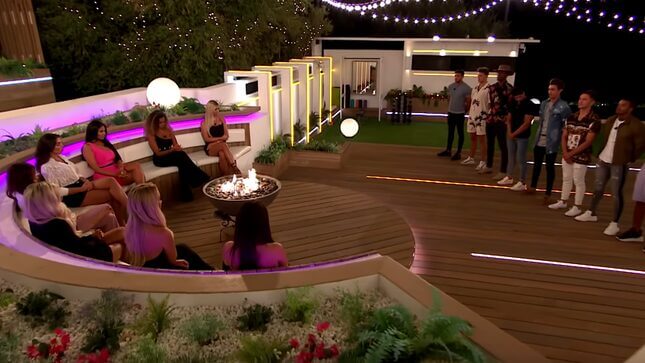

All reality television competitions are slightly dystopian. Beautiful, tanned young people are huddled and secluded together in a beach house, deserted island, or black box studio, stripped of their phones and a connection to the outside world. They fight and fuck for money or a shiny new husband, while anything existing outside the edges of the show seems to disappear, not just for contestants but for its viewers.
Watching Love Island—the English reality dating show that recently got an insufficient American update—feels especially claustrophobic. The show is a dating competition with so many twists and turns, it can feel as if producers are making it up as they go along. A handful of girls and a handful of boys arrive in a luxurious Spanish villa and are instructed to pair up with one another, sleeping in the same bed every night. This makes for awkward introductions as the group tries to assess each other based on buff physicality alone (a criteria later expanded immensely to “good banter” or “good chat,” various UK-isms for “nice sense of humor” and “easy to talk to.”) As the couples figure out if they’re really into one another, they’re subjected to weekly elimination ceremonies, during which contestants are allowed to pick new partners, the group continually mixing and matching like a game of R-rated spin the bottle. The show airs every night in the UK, and often viewers are instructed to vote for their favorite couples, leaving the unpopular to pack their bags.
What exactly is the goal of Love Island? Surely the show and some contestants would say that it’s to fall in love, to find that elusive “one.” Of course, anyone who has seen even 15 minutes of reality TV can say that this is bullshit, as most contestants are likely in it to advance their personal brands as models/boxers/Instagram famous pharmacists, etc. The couples who stay together the longest, who appear to have the most chemistry, are the ones who advance in the eyes of the voting public. But Love Island is not a show about falling in love as much as it is a show about breaking up, and the numbingly commonplace ways in which partners betray, cheat, and burn out on each other.
-

-

-

-

-

-

-

-

-

-

-

-

-

-

-

-

-

-

-

-

-

-

-

-

-

-

-

-

-

-

-

-

-

-

-

-

-

-

-

-








































